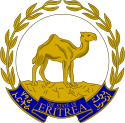Conduct
The UN Observer Mission to Verify the Referendum in Eritrea (UNOVER) was established pursuant to General Assembly resolution 47/114 of 16 December 1992 and lasted until 25 April 1993. [2] The goals of the mission were to verify the impartiality of the referendum, report claims of irregularities, and verify the counting, computation and announcement of the results.
The referendum was completed under budget, [3] and was considered free and fair. [2]
This page is based on this
Wikipedia article Text is available under the
CC BY-SA 4.0 license; additional terms may apply.
Images, videos and audio are available under their respective licenses.


